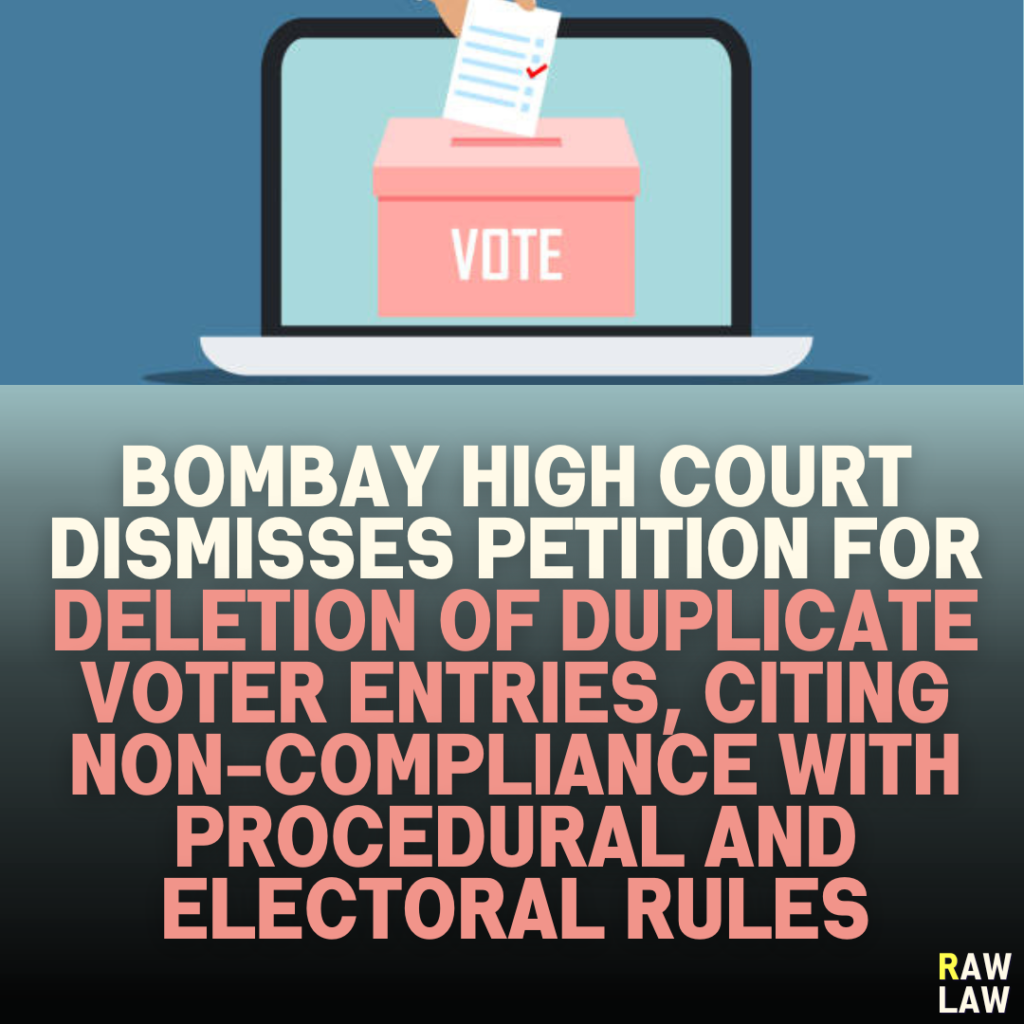Court’s Decision:
The Bombay High Court dismissed the petition seeking a writ of mandamus to compel election authorities to delete duplicate voter entries. The court held that the petitioner failed to comply with the procedural requirements under the Electoral Rules, particularly the requirement to submit Form 7 for each individual voter whose name was allegedly duplicated. The court ruled that no mandamus could be issued in the absence of adherence to the statutory procedure.
Facts:
The petitioner, a Member of the Legislative Assembly, alleged that approximately 43,000 voters were registered multiple times in the voter list for the Muktainagar constituency, ahead of the upcoming Maharashtra Legislative Assembly elections. He had made several representations to election authorities requesting verification and removal of these duplicate entries, citing the potential for bogus voting. Despite repeated submissions, no action was taken by the election authorities, prompting the petitioner to file a writ petition.
Issues:
- Whether the petitioner was entitled to a writ of mandamus directing the deletion of duplicate names from the voters’ list without adhering to the prescribed procedure.
- Whether the election authorities were justified in insisting on compliance with the procedural requirements for deletion of names from the voter list.
Petitioner’s Arguments:
The petitioner argued that the election authorities had failed in their duty to maintain a fair electoral roll by not acting on his repeated objections regarding the presence of duplicate voter entries. He contended that the authorities should have undertaken the task of verifying and removing these entries, given the substantial number of alleged duplicates, without strictly requiring compliance with Form 7. He relied on several judicial precedents to assert that free and fair elections were compromised by such irregularities in the voter list.
Respondent’s Arguments:
The respondents, including the election authorities, contended that the petitioner had not followed the proper procedure for objecting to duplicate entries. They argued that Rule 13 of the Registration of Electors Rules, 1960, requires objections to be filed in Form 7, which the petitioner had failed to do. The election authorities also emphasized that bulk objections, such as those presented by the petitioner, are not entertained as per the guidelines. Additionally, they noted that personal hearings had been given to the petitioner, but no actionable forms were submitted.
Analysis of the Law:
The court analyzed the procedural requirements under the Registration of Electors Rules, 1960, specifically Rules 13 and 17, which mandate that objections to voter list entries be filed individually in Form 7. The court also referred to instructions issued by the Election Commission of India, which prohibit the submission of bulk objections. These provisions aim to ensure an orderly and transparent process for maintaining the electoral roll, and failure to adhere to these rules disqualifies a claim for mandamus.
Precedent Analysis:
The court relied on several precedents, including Shyamdeo Prasad Singh v. Nawal Kishore Yadav and Lal Babu Hussein v. Electoral Registration Officer, to emphasize the importance of procedural compliance in electoral matters. The court noted that while the petitioner’s concerns about duplicate voter entries might be valid, the legal framework governing voter registration must be strictly followed.
Court’s Reasoning:
The court reasoned that the petitioner’s failure to comply with the procedural requirements under the Electoral Rules precluded the issuance of a writ of mandamus. It held that the statutory authorities are bound by the rules, which provide for individual objections through Form 7. The court also acknowledged that the petitioner’s bulk submission of names was not in conformity with the election laws, and as such, the election authorities were justified in refusing to act on his complaints.
Conclusion:
The court dismissed the petition, ruling that no writ of mandamus could be issued in the absence of compliance with the prescribed legal procedure. The petitioner was directed to follow the proper procedure if he wished to pursue his objections further.
Implications:
The ruling reinforces the principle that procedural compliance is essential in matters of electoral registration and objection handling. It underscores the role of election authorities in ensuring that elections are conducted fairly and in accordance with the law, but also that individuals seeking redress must adhere to the statutory framework. The decision also highlights the importance of timely and proper objections to voter lists, especially in the context of potential electoral fraud.



